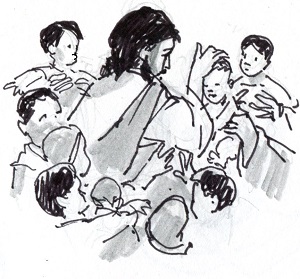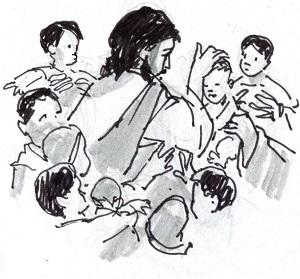

“My yoke is easy, and my burden is light” (Matt 11:30).
Fourteenth Sunday in Ordinary Time
Zech 9:9-10; Ps 145; Rom 8:9, 11-13; Matt 11:25-30
Prince Myskin, the central character in Dostoevsky’s novel, The Idiot, is regarded by others as hopelessly naïve, and his words, “Beauty will save the world,” are proof of this. The quote was a favorite of Dorothy Day, cofounder of the Catholic Worker Movement, and she understood it not as naivete but as an accurate perception of reality. She found real joy in sharing her life with the poor of this world.
Jesus is also often depicted as a hopeless idealist whose teachings on nonviolence and forgiveness are for saints but not for people who must live in the real world, where force and competition define human survival. But what if in fact Jesus was describing the most effective approach to living a full and successful life? From what he observed, evil was self-defeating, selfishness led to avarice and envy, violence to revenge and pride to certain downfall. On the other hand, the innocence of children is what drives parents to create a better world, goodness and beauty move hearts to kindness, and humility attracts favor and trust.
Even Jesus’ seemingly paradoxical sayings about the first being last and the last first, service leading to leadership, losing your life as the way to save your life, reveal the same logic as the universal Golden Rule and the wisdom of the underlying laws of life: “You reap what you sow” and “The measure with which you measure will be measured back to you.” Holiness is not for the heroic; it is the most natural way to live. The Shaker hymn, “Simple Gifts” captures this truth, praising the wisdom of “coming down where we ought to be” as the secret of a joyful life unburdened by anxiety or misplaced ambition.
Jesus shocked his disciples, ambitious and competitive for first place in line, when he stopped to bless children and their doting mothers. They were models, he said, for those who will enter the “Kingdom of God.” Their innocence and openness are what enables them to see life as God’s sees it, a garden of wonder and discovery, beauty and natural goodness.
How intelligent and sincere people have strayed so far from this simple formula for living is a question for psychologists, but it may have something to do with contemporary culture and even religion. A consumer culture based on needs and desires is like a religion that uses fear of spiritual failure to promote their services. Both promise happiness to people they have taught to be unhappy.
Jesus proposed God’s unconditional love as the foundation of a life free of fear and as gracious as God’s own generosity. Jesus proposed forgiveness to people whose lives were tied up in resentment and self-pity over unresolved conflicts. Set yourself free of old hurts and move on. He demonstrated just how easy life can be by inviting people into the “yoke” he was in, an analogy of how draft animals lighten the load by sharing it.
Jesus might have been the first to say, “Some people won’t take yes for an answer.” His Gospel was in its simplest and most direct form an invitation from God to be happy. The purpose of life was life itself, a gift we show our appreciation for, even with all its challenges and anomalies, by living it fully.
Dominican Fr. Tony Kilroy, who died June 17 in Minneapolis, focused his long ministry on asking people this question: “Do you know how wonderful you are?” What would you answer?
Advertisement







